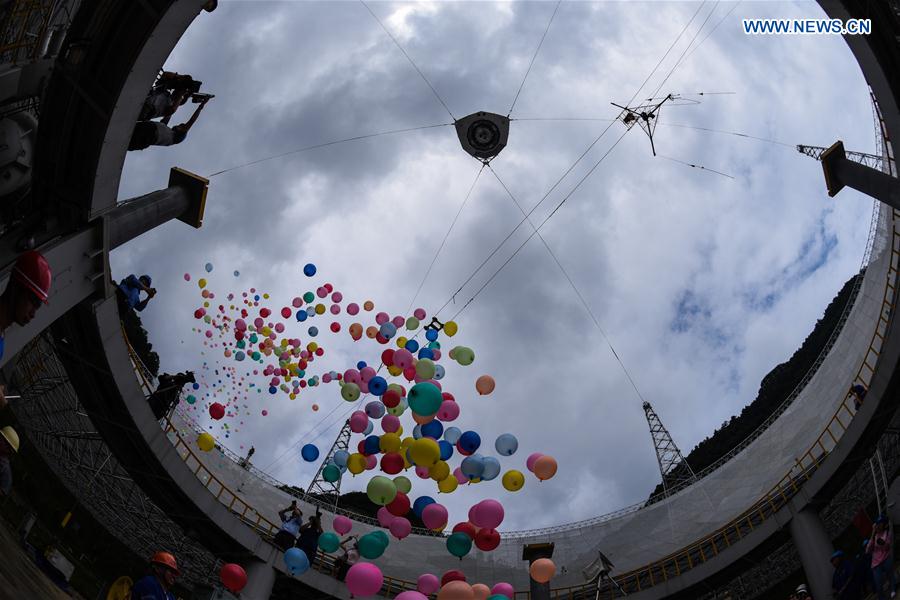


Balloons are released to celebrate the complete installation on the Five-hundred-meter Aperture Spherical Telescope (FAST) in Pingtang County, southwest China's Guizhou Province, July 3, 2016. Installation was completed on the world's largest radio telescope on Sunday morning as the last of 4,450 panels was fitted into the center of the big dish. Scientists will then begin debugging and trial observation of the FAST. (Xinhua/Ou Dongqu)
GUIYANG, July 3 -- Installation was completed on the world's largest radio telescope on Sunday morning as the last of 4,450 panels was fitted into the center of the big dish.
Hoisting of the last triangular panel to the reflector, which is the size of 30 football fields, began at 10:47 a.m. and lasted about 40 minutes. It was a landmark step for the telescope's planned launch of operations in September.
About 300 people, including builders, experts, science fiction enthusiasts and reporters, witnessed the installation at a karst valley in Pingtang County in the southwestern province of Guizhou.
Scientists will then begin debugging and trial observation of the Five-hundred-meter Aperture Spherical Telescope (FAST), said Zheng Xiaonian, deputy head of the National Astronomical Observation under the Chinese Academy of Sciences, which built the telescope.
The project has the potential to search for more strange objects to better understand the origin of the universe and boost the global hunt for extraterrestrial life, said Zheng.
Zheng said the radio telescope will be the global leader for the next 10 to 20 years.
Upon completion, the telescope will dwarf Puerto Rico's Arecibo Observatory, which is 300 meters in diameter. It will also be 10 times more sensitive than the steerable 100-meter telescope near Bonn, Germany, he said.
Work on the 1.2-billion-yuan (180 million U.S. dollars) FAST project began in 2011.
Day|Week

 China's first intelligent security robot debuts in Chongqing
China's first intelligent security robot debuts in Chongqing A Total of 3,552 Subscribers Vanish In Two Days; YouTube Closes All Doors to Users’ Inquiries
A Total of 3,552 Subscribers Vanish In Two Days; YouTube Closes All Doors to Users’ Inquiries Out of this world! Futuristic UFO-shaped yacht has its own garden and a stunning underwater viewing deck
Out of this world! Futuristic UFO-shaped yacht has its own garden and a stunning underwater viewing deck An old tea house in Chengdu
An old tea house in Chengdu Furious Customer Crushes All the Buns from Vendor Just Because He Was Given the Wrong Flavor
Furious Customer Crushes All the Buns from Vendor Just Because He Was Given the Wrong Flavor 20 post-90s couples hold ’naked marriage‘ in E. China
20 post-90s couples hold ’naked marriage‘ in E. China Female official wearing traditional Han costume to promote local tourism
Female official wearing traditional Han costume to promote local tourism Over 12,000 Runners Seek Medical Care in S China’s Marathon
Over 12,000 Runners Seek Medical Care in S China’s Marathon Six Luxury Sports Cars Totaled after Fail Attempts to Cross China’s Most Perilous Highway Linking SW China’s Sichuan and Tibet
Six Luxury Sports Cars Totaled after Fail Attempts to Cross China’s Most Perilous Highway Linking SW China’s Sichuan and Tibet Incredible Transformation: “Witch Child”Whose Parents Left Him for Dead in Nigerian Makes Speedy Recovery
Incredible Transformation: “Witch Child”Whose Parents Left Him for Dead in Nigerian Makes Speedy Recovery